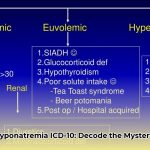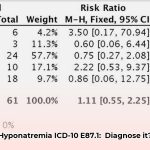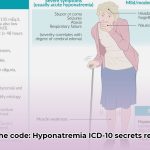Does “low sodium” ring a bell? Hyponatremia, a condition characterized by low sodium levels in the blood, is more common than you might think. This guide provides a comprehensive overview of ICD-10 code E87.1, encompassing its meaning, significance, and distinction from related conditions. Whether you’re a patient, medical coder, or healthcare professional, this resource offers clear, concise, and authoritative information.
What is Hyponatremia?
Hyponatremia occurs when the concentration of sodium in your blood falls below 135 mEq/L. Sodium is essential for proper nerve and muscle function, fluid balance, and blood pressure regulation. A deficiency can disrupt these vital processes. Two key terms to understand are:
- Hyponatremia: Low sodium concentration in the blood.
- Hypo-osmolality: A decreased concentration of particles dissolved in the blood serum, often associated with hyponatremia. It essentially means your blood is too diluted.
E87.1: The Code and Its Context
| Feature | Detail |
|---|---|
| ICD-10 Code | E87.1 |
| Description | Hypo-osmolality and Hyponatremia |
| Excludes | SIADH (E22.2) |
| Billable | Yes |
| Effective Date | October 1, 2024 (ICD-10-CM 2025) |
This code helps categorize and track hyponatremia for billing, research, and epidemiological purposes. Its inclusion in the broader ICD-10 framework provides valuable context for understanding its relationship to other metabolic disorders.
E87.1 vs. SIADH (E22.2): A Crucial Distinction
While both hyponatremia (E87.1) and SIADH (Syndrome of Inappropriate Antidiuretic Hormone secretion, coded as E22.2) involve low sodium, they are distinct conditions. SIADH is a specific cause of hyponatremia, where the body retains excess water, leading to dilution of sodium. Other factors can also cause hyponatremia, such as certain medications, kidney problems, or excessive water intake. This distinction is essential for accurate diagnosis, treatment, and coding. For more information on SIADH, see the ICD-10 code E22.2. Note: Replace with actual link when publishing.
Why Accurate Coding Matters
Accurate coding with E87.1 (and its sub-codes like E87.10, E87.11, and E87.12, which specify the cause of hyponatremia) is crucial for:
- Proper Billing and Reimbursement: Accurate codes ensure healthcare providers are compensated correctly for services rendered.
- Medical Research and Data Analysis: Reliable coding enables researchers to track hyponatremia trends, identify risk factors, and develop better treatments.
- Public Health Surveillance: Coding helps monitor the prevalence of hyponatremia and its impact on population health.
Hyponatremia: Causes, Symptoms, and Treatment
Causes
Hyponatremia can result from various factors, including:
- Medications: Certain diuretics, antidepressants, and pain relievers can increase the risk.
- Medical Conditions: Heart failure, kidney disease, liver cirrhosis, and hormonal imbalances can contribute.
- Lifestyle Factors: Excessive water intake, particularly during endurance activities, can dilute sodium levels.
- Other Factors: Vomiting, diarrhea, and excessive sweating can lead to sodium loss.
Symptoms
Symptoms can range from mild to severe, depending on the severity and rapidity of the sodium decline. Mild hyponatremia may cause:
- Nausea and vomiting
- Headache
- Confusion
- Fatigue
- Muscle weakness, spasms, or cramps
More severe hyponatremia can lead to:
- Seizures
- Coma
- Death
Diagnosis and Treatment
Diagnosis typically involves blood tests to measure serum sodium levels and may include additional tests to identify the underlying cause. Treatment depends on the cause and severity but may involve:
- Fluid Restriction: Limiting fluid intake can help increase sodium concentration.
- Addressing Underlying Conditions: Treating the underlying medical issue, such as heart failure or kidney disease, is essential.
- Medications: In some cases, medications may be prescribed to manage symptoms or address specific causes.
- Intravenous (IV) Fluids: For severe hyponatremia, IV fluids containing sodium may be necessary.
Ongoing Research and Future Directions
Research into hyponatremia is ongoing. Scientists are investigating the complex interplay of genetic, hormonal, and environmental factors contributing to the condition. Some research suggests that certain genetic variations might predispose individuals to hyponatremia. Additionally, studies are exploring new diagnostic tools and treatment strategies, such as personalized medicine approaches based on individual patient characteristics.
Disclaimer
This information is intended for educational purposes only and should not be considered medical advice. Consult with a qualified healthcare professional for any health concerns or before making any decisions related to your health or treatment. Medical knowledge is constantly evolving, so staying informed and engaged in your healthcare is key.
- Best Books on Meditation Recommended by Mindfulness Experts - January 30, 2026
- Best Mindfulness Books for Anxiety, Sleep, and Daily Peace - January 29, 2026
- Books On Mindfulness For A Happier, More Present Life - January 28, 2026
















